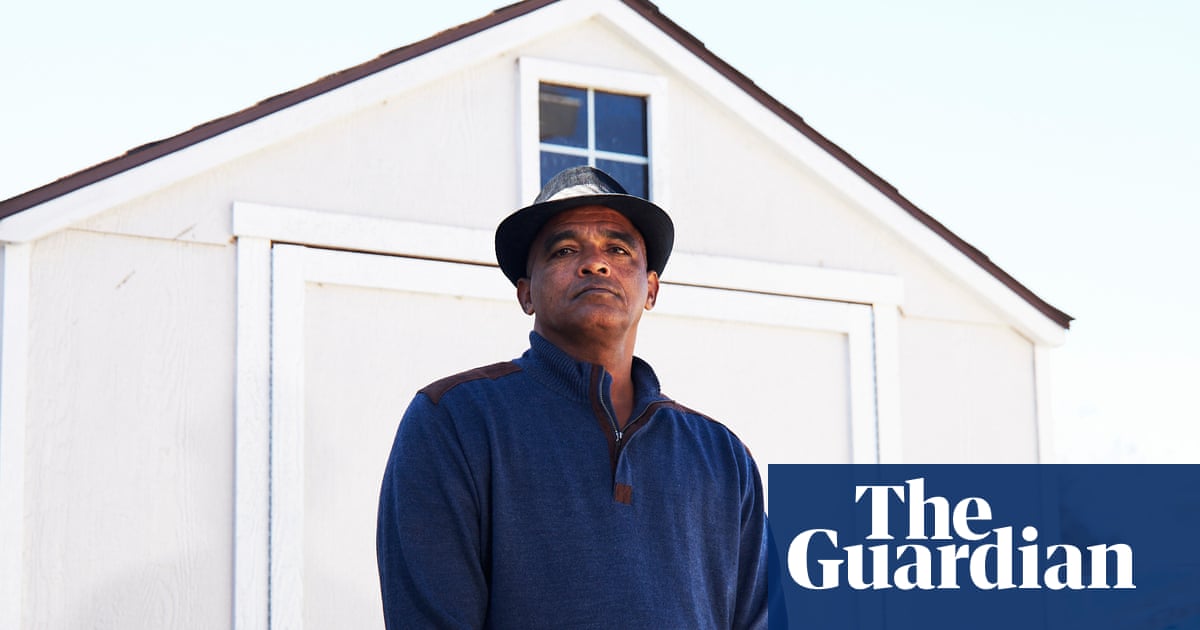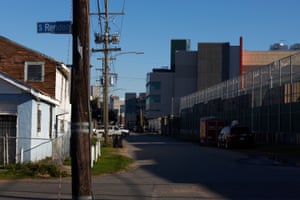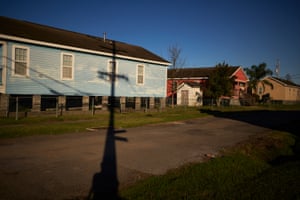For those who live in poverty, money bail can mean an incarceration. And some judges believe thats in their best interest

Adrian Caliste held his mothers emaciated body as the Alzheimers that long ravaged her mind finally took her life. The last words she uttered were from Psalm 23: The Lord is my shepherd. I shall not want.
And then she was gone.
Devastated, Caliste soon returned to a familiar escape: crack.
The 58-year old went on a drug binge in the Upper 9th Ward neighborhood of New Orleans, where he grew up with his nine siblings. He disappeared among the street junkies and hustlers, becoming unrecognizable to both family and friends.On the nights he was too high to go home to his wife and children, Caliste would stagger into the Mount Olivet Cemetery, lay his gaunt body on top of his mothers grave and close his eyes.
Talk about a good peaceful sleep, he recalled during a recent interview at his attorneys office. Its so quiet in there.
Five months after his mothers death, on 19 June 2017, Caliste hit rock bottom. Police pulled him over in his pickup truck with a suspected drug dealer, and found crack, marijuana, and a glass pipe in his possession. They arrested him on two drug charges.
The following morning, Caliste appeared before Magistrate Court Judge Harry Cantrell, the father-in-law to Mayor LaToya Cantrell. The judge, a registered Democrat, has been repeatedly accused by civil rights attorneys and public defenders of setting excessive bail without considering defendants ability to pay. Caliste was no different. Even though his lone source of income was a monthly $1,100 disability check and though he didnt have a violent criminal history, Cantrell slapped him with a $5,000 bond.

And like so many poor people before him, Caliste was sent back to his cell in the violence-plagued Orleans Parish jail to await trialwhile wealthier people accused of the same crimes walked free.
This moment sparked a historic class action lawsuit against Cantrell, where attorneys alleged that he was locking up people for being poor. When a federal court, one year later, struck down his bond-setting practices as unconstitutional, civil rights advocates rejoiced.
The ruling today means that people who are arrested in Orleans Parish should get a full and fair hearing on their pretrial release, attorney Katie Schwartzmann said at the time on behalf of the MacArthur Justice Center in New Orleans which, along with the Civil Rights Corps in Washington DC, filed the lawsuit on Calistes behalf.
It seemed like a turning point, one that positioned New Orleans to join a larger, national movement to eliminate or severely curtail money bail. Washington DC ended the practice decades ago while cities such as Houston, and states including California, Maryland and New York have taken similar steps.
Such sweeping reforms, however, have yet to materialize in New Orleans. Cantrell continues to set excessive bonds in defiance of the federal order, according to civil rights attorneys, while city leaders have shown little appetite to force his hand. (The judge and mayor declined an interview request for this story.)
I find it very troubling that the government as a whole, whether its the mayors office, the council or the judges, are all essentially ignoring these civil rights orders coming out of the federal court when the violations are happening every day, said Jon Wool, director of justice policy at the Vera Institute of Justice in New Orleans.
A dozen men and women in shackles and orange jumpsuits rose to their feet as Cantrell took the bench on a recent Monday morning. In 2019, roughly 6,000 people were arrested on at least one new felony charge in New Orleans, according to the Vera Institute Cantrell personally set bail in a majority of the cases.
First elected in 2013, Cantrell, 72, ran on a promise that he would administer justice fairly and impartially while also protecting the public from dangerous offenders. His campaign attracted endorsements from high-profile officials across the political spectrum, including the current mayor who was then a member of the city council.
Prior to that, he served 15 years as a magistrate commissioner, an unelected position appointed by the criminal court judges. There are four commissioners who set bonds in the afternoons and weekends while the magistrate judge handles mornings.
Cantrell, a soft-spoken man with a salt and pepper beard, began the days hearing by calling out the names of each of the arrestees. He asked if they were employed, and if so, how much money they made. Many were reliant on social security checks. Some worked for temp agencies. Others made as little as $7.25 an hour the minimum wage as dishwashers or cooks. And all but a handful were black. In New Orleans, African American families pay 88% of bail, reports Vera.
After appointing each a public defender and confirming police had probable cause for their arrests, Cantrell moved to set bail. A young woman arrested for possession of narcotics with intent to distribute and an illegal firearm soon stood before him.
Meghan Garvey, the bond advocacy attorney for the Orleans Public Defenders, made the case the woman should receive a nominal bail so she could be released pending trial. She ticked through the reasons why: she had never been previously arrested; she made a meager living as a self-employed beautician; and pre-trial services a program overseen by the state supreme court assessed her flight and public safety risk at the lowest level possible.

Courts typically use bail to ensure arrestees return for their hearings. Defendants can pay a commercial bail bondsman a non-refundable deposit, about 12% of the total bail amount. Or they can pay the full amount in cash, which is returned in full if they comply with all their legal requirements. This is a route commonly available only to wealthier people.
Male defendants forced to sit in jail because they cant make bail have a median annual income of $15,598 compared to $39,600 for the average, non-incarcerated man, according to the Prison Policy Initiative, a nonprofit in Northampton, Massachusetts.
If judges believe the person to be a serious flight risk or an imminent threat to the community, they can set an amount so high the person is guaranteed to stay in jail. This is supposed to be used in only rare cases, according to the US Supreme Court which stated in a 1987 case that liberty should be the norm and pretrial detention a carefully limited exception.
For many people living in poverty, however, any amount of bail can mean incarceration. A 2018 report from the Federal Reserve found that 39 percent of adults dont have $400 in savings to use in times of emergency. The number is likely higher in Louisiana, which has the nations third highest poverty rate.
After listening to Garveys arguments, Cantrell said he carefully considered the Caliste requirements, yet set the womans bail at $11,000.
Your honor, there is no evidence she is a danger to the community, Garvey objected. This is a violation of her constitutional rights and it violates the federal court ruling.
Cantrell waved off Garveys concerns, insisted he was protecting her clients rights, then sent the 20-year-old woman back to jail.
Its been 17 months since US district court judge Eldon Fallon ruled that Cantrells bail-setting practices violated the 14th amendment, which prohibits the jailing of people solely because they are poor. This was supposed to prevent future cases such as Calistes, who was released after spending nearly three weeks in jail.
But civil rights attorneys contend Cantrell routinely ignores two of the rulings basic requirements: that he ask people about their ability to afford bail; and consider alternatives to bail.
In one case, Cantrell told a public defender Fallons order was not the law of the land when she objected to him setting bail without herself or her client present.

More recently, Cantrell set a $1,250 bond on Miles Moran, a homeless man arrested for allegedly stealing $21.28 of drinks and potato chips from a drug store. Morans public defender argued her client was indigent and couldnt afford any amount of bond. If released pending trial, she told the judge, he would admit himself to a local drug treatment facility where a bed was waiting for him. Cantrell lowered the bond to $300 at a second hearing, which was still more than Moran could afford.
He spent the next two months in jail until prosecutors dropped the charges to misdemeanors, after which he was released.
Calvin Johnson, the former chief judge of Criminal District Court and a leading voice in reforming New Orleans criminal justice system, said Cantrell is a good person who means well. But like many people operating in a system resistant to change, he is stuck in an old school way of thinking.
He simply cant make the leap to setting no bond. Its a foreign concept to him, Johnson said. Hes 72 years old and set in his ways. And if you ask him to change, hell say, Never. Period. Dont ask me again. Thats who he is.
And he is not alone.
He represents the majority of the folk who operate in the justice system when it comes to bail, Johnson said. If you get outside New Orleans youre going to find people just like him.
In response to Cantrells continued intransigence, civil rights attorneys Eric Foley and Alec Karakatsanis filed a motion for contempt against Cantrell on 10 January, which could result in fines or even jail time.
Nobody wants to go hauling judges in front of other judges, said Jim Craig, director of the MacArthur Justice Centers New Orleans office. Contempt is extreme. Its meant to be extreme. But old practices and old ways of thinking die very hard.

Cantrells attorney, Mindy Nunez Duffourc, said the court maintains [that] all of its bail settings are in compliance with the due process clause of the constitution and that Cantrell is following the so-called Caliste requirements to the letter.
The plaintiffs seem to be complaining about the entire bail system. They dont want it at all, Duffourc said. But these judges have inherited the way the court operates and thats according to state and federal law, which allows them to set bail.
That could soon change, however, as Fallon ruled it unconstitutional and a conflict of interest for Cantrell to set bail while, at the same time, using a portion of that money to pay for his staff salaries and benefits, as well as travel and other expenses. Bail revenue, in addition to fines and fees, accounts for nearly 25 percent of the courts finances.
Cantrell has twice appealed this ruling to the fifth US circuit court of appeals and was rejected each time. He has asked the US supreme court to review the lower courts decisions.
If the supreme court denies the request, Cantrell would continue to be prohibited from setting bail under the current system, said Wool with the Vera Institute.
This is a unique opportunity for New Orleans to do what only a handful of places have been able to do, and thats get rid of money bail, Wool said. This city should be taking the lead in eliminating these practices which overwhelmingly, in a shameful way, impact black residents.

Photograph: Edmund D Fountain/The Guardian
Caliste was eventually released after spending 20 days in jail under the condition he enter a drug treatment program. He later pleaded guilty to possession with intent to distribute in federal court and was given credit for time served. Caliste is now two-years sober and a deacon at a local church where he ministers to people struggling with homelessness and addiction.
It feels like a dream, sort of, and I woke up, he said of the dark period following his mothers death. What I have in me is better than what I was doing.
The class action lawsuit that bears his name didnt seek monetary damages. Caliste didnt make a dime off of it. He just wanted to do whats right, he said. Most importantly, he wanted peace of mind.
On a recent visit with his family, Caliste and his sister, Rochelle, watched a video of their mother on her death bed. Their father is singing to his wife of 63 years, holding her skeletal hand, telling her how much he loves her. She opens her eyes wide, as if coming out of a fog, and tries to sing along. She died a few days later.
Rochelle looked at her brother, his eyes fixed on the screen. Are you OK? she asked.
Im good, he said smiling. Yeah, Im all good.


Recent Comments